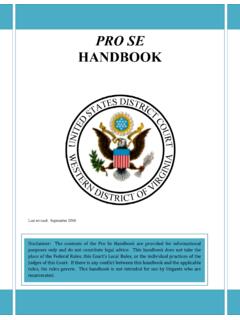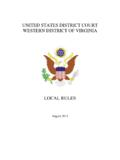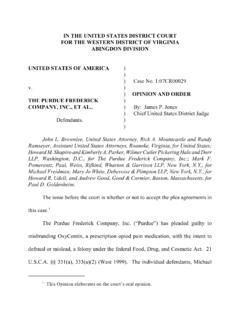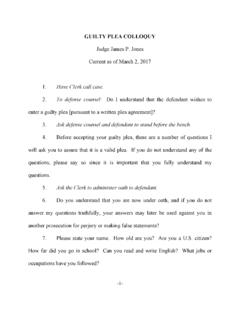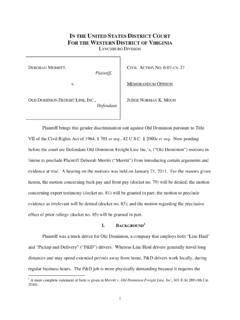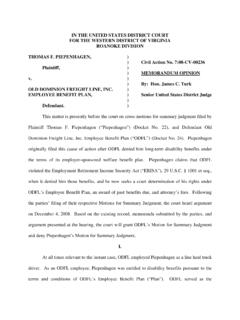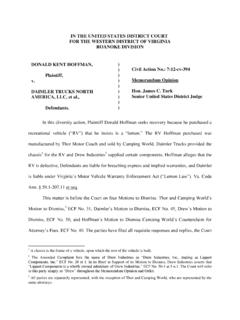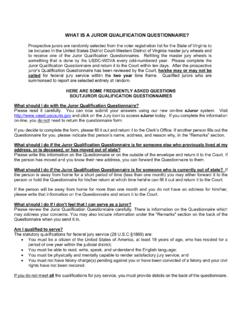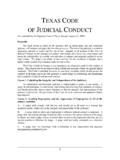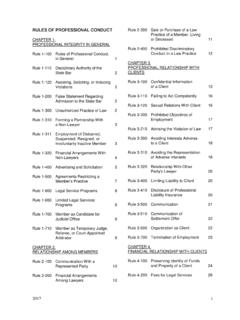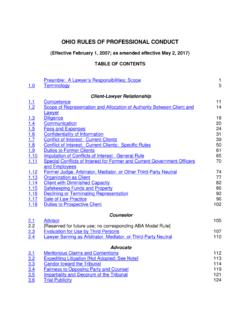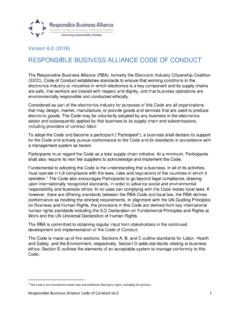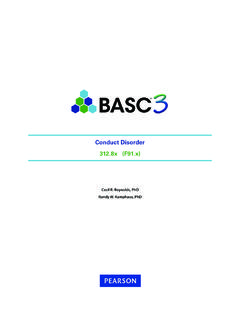Transcription of CODE OF PRETRIAL AND TRIAL CONDUCT
1 CODE OF PRETRIAL AND TRIAL CONDUCTP lease accept this copy of the Code of PRETRIAL and TRIAL CONDUCT published by the American College of TRIAL Lawyers. The development of this Code by the Fellows of the College and its distribution to persons and institutions engaged in all aspects of the administration of justice represents an important part of the execution of the College s mandate to improve and elevate standards of TRIAL practice, the administration of justice and the ethics of the American College of TRIAL Lawyers, founded in 1950, is composed of the best of the TRIAL bar from the United States and Canada. Fellowship in the College is extended by invitation only, after careful investigation, to those experienced TRIAL lawyers who have mastered the art of advocacy and whose professional careers have been marked by the highest standards of ethical CONDUCT , professionalism, civility and collegiality.
2 Lawyers must have a minimum of 15 years experience before they can be considered for Fellowship. Membership in the College cannot exceed 1% of the total lawyer population of any state or province. Fellows are carefully selected from among those who represent plaintiffs and those who represent defendants in civil cases; those who prosecute and those who defend persons accused of crime. The College is thus able to speak with a balanced voice on important issues affecting the administration of justice. The College is confident that utilization of this Code in the course of legal proceedings in the courts and as a teaching aid at the Bar and in the nation s law schools will represent a positive contribution to improving and elevating standards of TRIAL practice, the administration of justice and the ethics of the OFFICE19900 MacArthur 610 Irvine, CA 92612t: : For more than fifty years, the American College of TRIAL Lawyers has promoted professionalism in the CONDUCT of TRIAL litigation.
3 Its authoritative Code of TRIAL CONDUCT , first published in 1956, has served as an enduring landmark in the development of professional standards for advocates. The College continues those efforts through the publication of its revised and enlarged Code of PRETRIAL and TRIAL CONDUCT . This comprehensive resource sets out aspirational principles to guide litigators in all aspects of their work as advocates of client interests. The Code looks beyond the minimum ethical requirements that every lawyer must follow and instead identifies those practices that elevate the profession and contribute to fairness in the administration of justice. As Justice Frankfurter noted, An attorney actively engaged in the CONDUCT of a TRIAL is not merely another citizen.
4 He is an intimate and trusted and essential part of the machinery of justice, an officer of the court in the most compelling sense. I encourage lawyers who engage in TRIAL work to observe and advance the principles that the College has set forth in this volume. I commend the American College of TRIAL Lawyers for its leadership in defining and refining the standards of professionalism that are vital to our system of justice. John G. Roberts, Justice of the United StatesMessage from the Chief Justice of the United States hold every man a debtor to his profession; from the which, as men of course do seek to receive countenance and profit, so ought they of duty to endeavor themselves, by way of amends, to be a help and ornament thereto. Sir Francis Bacon IApproved by the Board of Regents, June 2009 Copyright 2009 American College of TRIAL LawyersAll Rights ReservedAmericAn college of TRIAL lAwyersCODE OF PRETRIAL AND TRIAL CONDUCTCODE OF PRETRIAL AND TRIAL CONDUCTT able of OF PRETRIAL AND TRIAL CONDUCT1 ForwardThe Legal Ethics and Professionalism Committee of the American College of TRIAL Lawyers (the College ) is charged with the following mandate:To advance, improve, and promote ethical standards and professionalism in the TRIAL bar in all its aspects in both the United States and Canada as well as to engage in such other activities as may be directed by the Board of Regents.
5 All jurisdictions have codes of CONDUCT that prescribe minimum standards for disciplinary purposes. There is no need here to duplicate such standards. This ACTL Code represents an attempt by the College to set down aspirational, rather than minimal, guidelines for TRIAL lawyers and judges. The problem in TRIAL practice today is not that lawyers violate the ethical rules, although some lawyers do. Most lawyers know the rules and try to comply. The real problem is the gradual corrosion of the profession s traditional aspirations, which are: Honor for values such as honesty, respect and courtesy toward litigants, opposing advocates and the court; A distaste for meanness, sharp practice, and unnecessarily aggressive behavior; Engagement in public service; A focus on the efficient, fair preparation and TRIAL of cases; and A role as agent for counseling and for the resolution of disputes.
6 Despite what the profession says, the profession often acts as if these values are inconsistent with effective advocacy in an adversary system of justice. The College is uniquely positioned to lead the way in changing these attitudes because it strives to offer Fellowship only to those lawyers who embody the skill and values to which they and the profession should aspire. The College cannot lead by focusing on the lowest floor of acceptable behavior. The College sees the new code as one that can be endorsed by courts, that can be profitably used in training programs by law schools and bar organizations, and that describes the values that the Fellows of the American College of TRIAL Lawyers endorse and practice daily. The new Code of PRETRIAL and TRIAL CONDUCT is a product that the College believes can be endorsed by courts and the profession as articulating the level of CONDUCT to which all members of our profession should aspire.
7 If TRIAL lawyers practice these principles the profession will begin a process of change that benefits lawyers, litigants, and our system of justice. CODE OF PRETRIAL AND TRIAL CONDUCT2 PreambleAdmission to the Bar is a high honor, and those lawyers who devote their lives to presenting cases in the courts are truly privileged. TRIAL lawyers are officers of the court. They are entrusted with a central role in the administration of justice in our society necessary to democracy. Lawyers who engage in TRIAL work have a special responsibility to strive for prompt, efficient, ethical, fair and just disposition of litigation. The American College of TRIAL Lawyers believes that, as officers of the court, TRIAL lawyers must CONDUCT themselves in a manner that reflects the dignity, fairness, and seriousness of purpose of the system of justice they serve.
8 They must be role models of skill, honesty, respect, courtesy, and fairness consistent with their obligations to the client and the court. TRIAL lawyers have a duty to CONDUCT themselves so as to preserve the right to a fair TRIAL , one of the most basic of all constitutional guarantees, while courageously, vigorously and diligently representing their clients and applying the relevant legal principles to the facts as found. Without courtesy, fairness, candor, and order in the PRETRIAL process and in the courtroom, reason cannot prevail and constitutional rights to justice, liberty, freedom and equality under law will be jeopardized. The dignity, decorum and courtesy that have traditionally characterized the courts are not empty formalities. They are essential to an atmosphere in which justice can be client, corporate or individual, however powerful, nor any cause, civil, criminal or political, however important, is entitled to receive, nor should any lawyer render, any service or advice encourag-ing or inviting disrespect of the law or of the judicial office.
9 No lawyer may sanction or invite corruption of any person exercising a public office or private trust. No lawyer may condone in any way deception or betrayal of the court, fellow members of the Bar, or the public. A lawyer advances the honor of the pro-fession and the best interests of the client when a lawyer embodies and encourages an honest and proper respect for the law, its institutions and officers. Above all, a lawyer finds the highest honor in a deserved reputation as an officer for justice, faithful to private trust and to public duty, and as an honest Code of PRETRIAL and TRIAL CONDUCT ( the Code ) is not intended to supplant any local rules, procedural rules, or rules of professional CONDUCT . This Code aims to provide aspirational guidance for TRIAL lawyers. It sets forth a standard above the ethical minimum a standard of CONDUCT worthy of the privileges and responsibilities conferred on those who have sworn to serve our system of Code is intended to provide guidance for a lawyer s professional CONDUCT except insofar as the applicable law, code or rules of professional CONDUCT in a particular jurisdiction require otherwise.
10 It is an aspirational guide for TRIAL lawyers and should not give rise to a cause of action or sanction, create a presumption that a legal duty has been breached or form the basis for disciplinary proceedings not created under the applicable law, court rules or rules of professional OF PRETRIAL AND TRIAL CONDUCT3 CODE OF PRETRIAL AND TRIAL CONDUCTQ ualities of a TRIAL LawyerTrial lawyers are officers of the court. They are entrusted with a central role in the administration of justice in our society. Lawyers who engage in TRIAL work have a special responsibility to strive for prompt, efficient, ethical, fair and just disposition of litigation. Honesty, Competence and Diligence(a) A lawyer must in all professional CONDUCT be honest, candid and fair.(b) A lawyer must possess and apply the legal knowledge, skill, thoroughness and preparation necessary for excellent representation.
